They have friends in high places and a stranglehold over the private security industry. Serbia’s football thugs are flexing their muscles.
Slobodan Vukić was drinking whiskey at the Tilt nightclub on Belgrade’s Sava riverfront when drunkenness turned to disaster. After knocking over some glasses at the bar, the 30-year-old truck driver tried to order more shots. His friends wanted him to leave. Vukić persisted. Then the bouncers came. “I know these places and these people,” said Miroslav Basta, a friend who was with Vukić at the club that night in December 2015. “They beat you up, then they throw you out, no matter if you’ve caused trouble or not.” He was right to be afraid. By the time the bouncers had finished with him, Vukić had blood all over his face and T-shirt and was slumped on the pavement outside the club, Basta recalled. Before long, he slipped into a coma. Within two weeks, he was dead. The cause of death was internal trauma.
Three-and-a-half years later, one of the bouncers is on trial at the Higher Court in Belgrade, charged with grievous bodily harm. Milovan Tadić admits kicking Vukić in the leg but denies delivering a serious blow to his abdomen. The incident at Tilt was one of a string of attacks in recent years on Belgrade clubbers – some deadly, some debilitating – by bouncers acting more like hooligans than security staff hired to keep the peace.
Analysts say there is a simple explanation: nightclub security in Serbia is often in the grip of actual hooligans – gangs of diehard football fans infamous for violence both on and off the terraces. Control the door and you control the drug-dealing that goes on inside – a lucrative side hustle, they say. And despite new laws to keep thugs out of the security industry, hooligans are also employed as bodyguards, night watchmen and security guards — all entrusted with public safety.
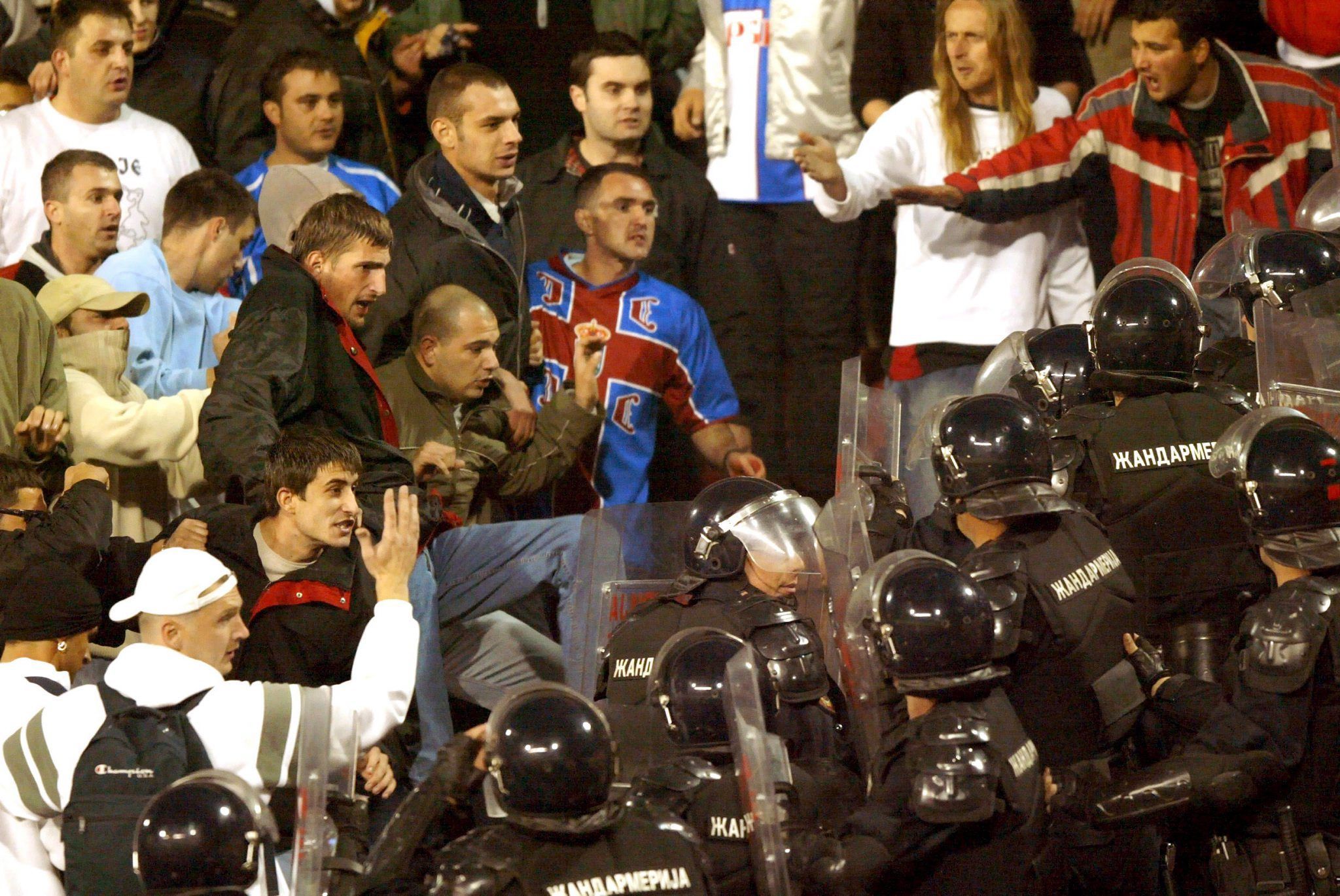
Serbian football fans clash with Serbian police during the World Cup 2006 qualification match between Serbia-Montenegro and Bosnia-Herzegovina in Belgrade. Photo: © Koca Sulejmanovic / EPA / picturedesk.com
Serbia has a history of tolerating hooliganism. In the Balkan wars of the 1990s, they swelled the ranks of paramilitaries, most famously the “Tigers” militia commanded by the late Željko „Arkan“ Ražnatović, leader of a hardcore group of Red Star Belgrade supporters. In times of peace, they have knocked heads together to shape public opinion. Having fought his wars, fan groups helped bring down Serbian strongman Slobodan Milošević. They are known for leading riotous protests against the arrest of war criminals, independence for Kosovo and LGBT rights.
With the rise over the past six years of the ruling Serbian Progressive Party, analysts say the relationship between the state and football supporter groups has evolved into something like a working arrangement: in exchange for obedience on the streets, hooligans can pursue their business activities relatively unmolested. For a glimpse of this new level of cosiness, they point to a notorious Belgrade fan group with alleged connections not only to private security contractors but also state officials including a senior police adviser and the secretary-general of the Serbian government. They call that group the “Janjičari”.
Quid pro quo
In the autumn of 2016, Aleksandar Stanković, alias “Sale the Mute”, was getting into his silver Audi A6 in Belgrade’s Vozdovac district when two unidentified gunmen opened fire. Shot more than 50 times in a gangland-style hit, he was the latest in a long line of leaders of hooligan groups to be killed in Serbia in the preceding few years. “Sale the Mute” had a string of indictments to his name – for making death threats, torture, beatings, drug offences and gun possession. Despite the catalogue of allegations, he had spent remarkably little time in custody. He was sentenced to five years and 10 months in 2013 for running a drug-dealing ring but the First Basic Court in Belgrade postponed his imprisonment a dozen times, 10 of them for health reasons. All other charges had either been thrown out or were pending at the time of his death.
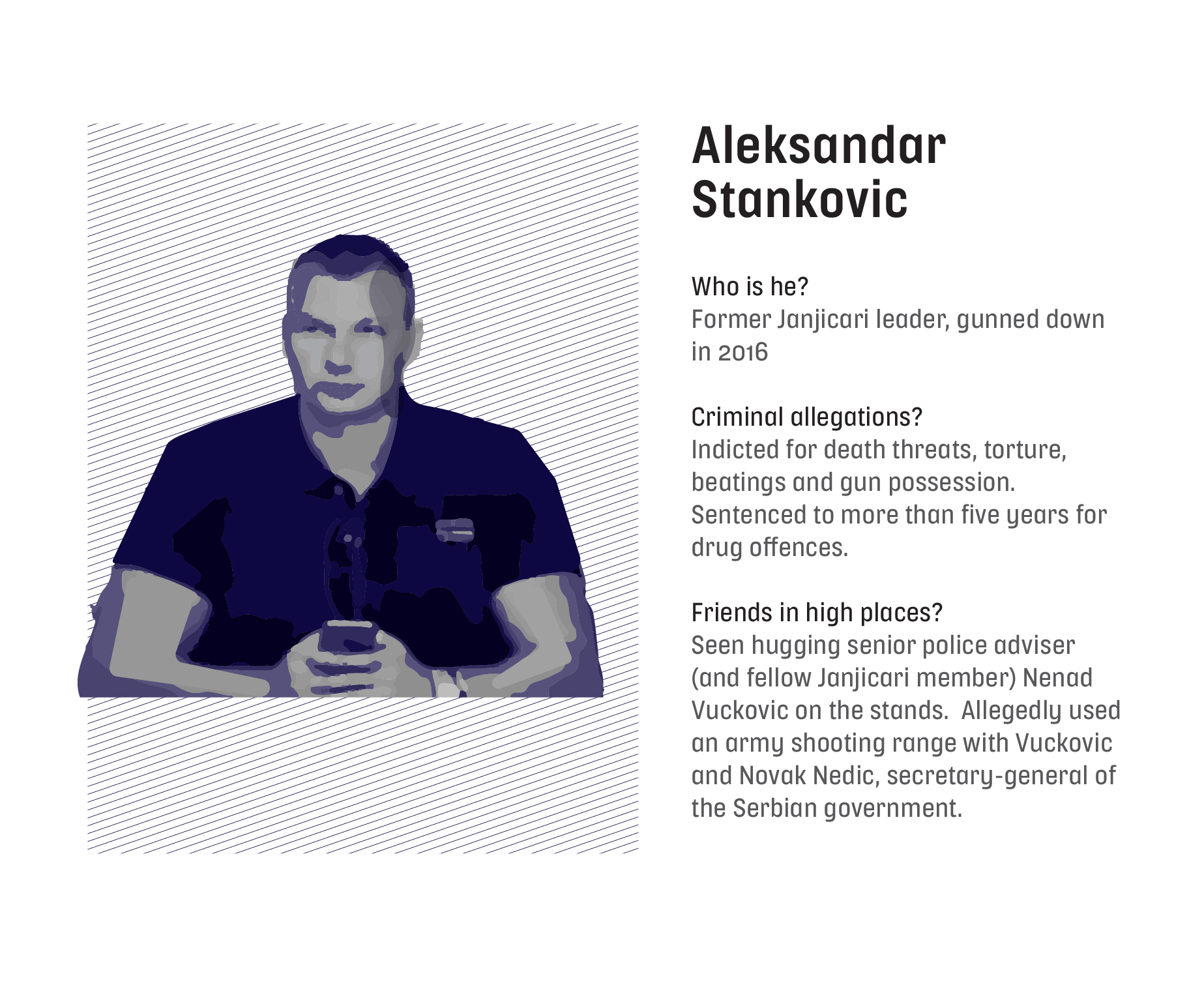
A day after the murder, Interior Minister Nebojša Stefanović organised an emotional news conference to declare war on organised crime, prompting many to wonder why the death of a notorious hooligan warranted such a high-level response. Stanković was well known as leader of the Janjičari, a faction of extreme fans of Partizan FC, one of two Belgrade football teams that attract fanatical support across Serbia (the other is Red Star). The group’s nickname (“Janissaries” in English) is a reference to the praetorian guard of the Ottoman Sultan, said to be recruited mostly from Christian boys abducted in the Balkans.
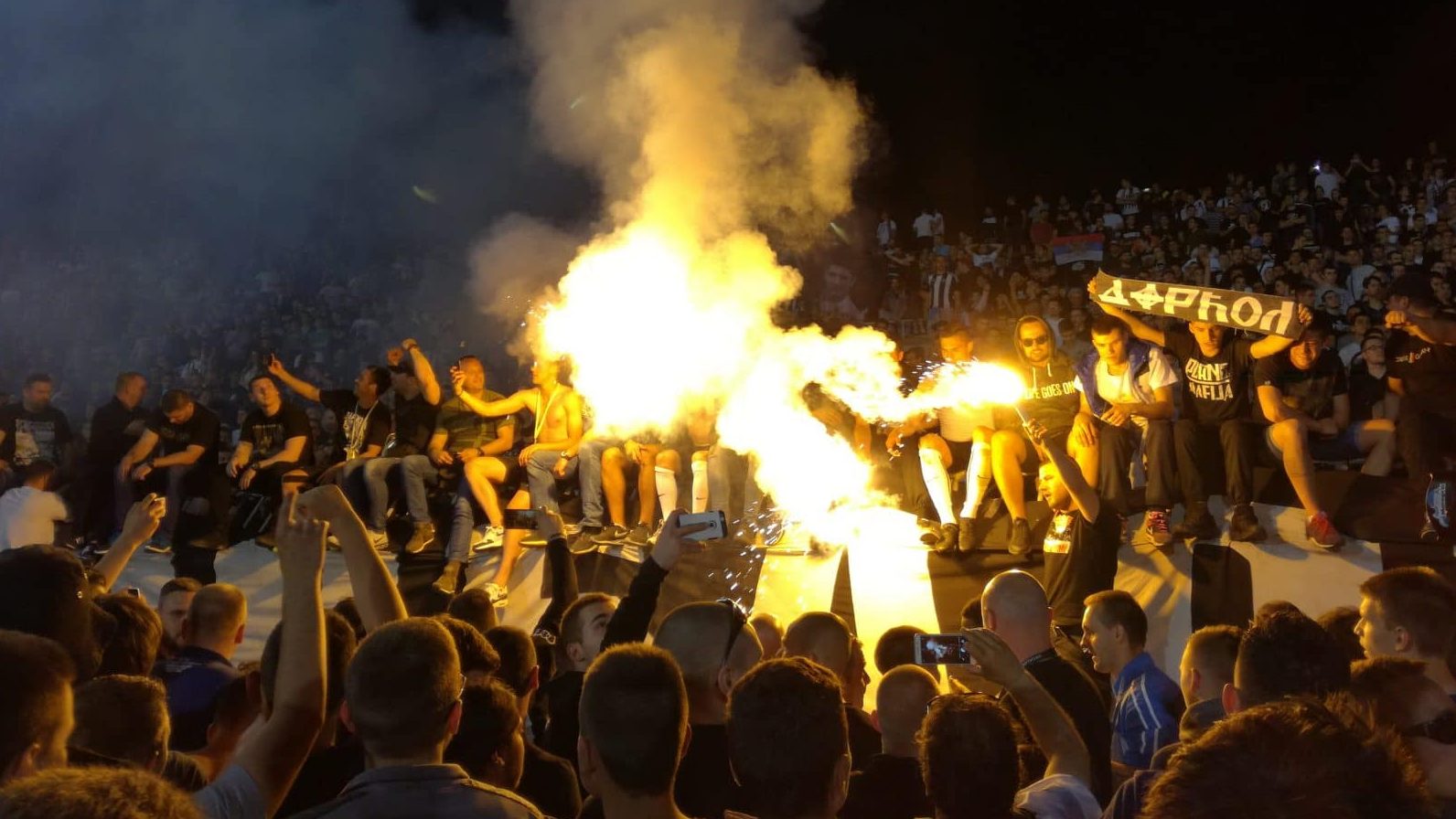
A row of hardcore Partizan supporters, including Milovan Tadić (fourth from the left), celebrate their team’s victtory on the south terrace of Partizan stadium in May 2017. Photo: © BIRN – Balkan Investigative Reporting Network
The Janjičari rose to prominence in 2013 when Stanković, then a Red Star supporter, mobilised a posse of tough guys to seize control of Partizan FC’s south stands from “Alcatraz”, the dominant supporter group at the time, according to local media reports. To control the stands is to lead the chants of club supporters. But experts say it also secures the right to provide private security services at certain Belgrade nightclubs, along with drug-dealing inside. Members of Red Star fan groups have a similar chokehold over nightclub security in the capital, they say.
A cosy relationship
Serbia’s hooligans have long punched above their weight on political matters, helping to shape public attitudes in the stadiums and on the street – often with tacit approval from politicians, experts say.
Many remember clashes between supporters of Serbian team Red Star and Croatian team Dinamo in Zagreb in 1990 as the opening salvo in the Balkans conflict that engulfed the former Yugoslavia. Throughout the wars, Serbian strongman Slobodan Milošević used football fans to promote nationalism and spread propaganda, historians say.
In 2000, hooligan groups turned against Milošević to support the “October 5th Revolution” following disputed elections that led to massive street protests. After Kosovo declared independence in 2008, members of football fan groups ransacked the centre of Belgrade and set fire to the US embassy. “You could tell there was still some hidden influence on the hooligan groups,” said security analyst Saša Đorđević. “During the ‘Kosovo is Serbia’ protest [in 2008], police practically let hooligans destroy the town. You could tell the hooligans were used in certain situations that could not be solved by law.” In subsequent years, hooligans allegedly caused mayhem at Pride Parades, beating up members of the lesbian, gay, bisexual and transgender community. They also sent death threats to journalists.
When the newly born Serbian Progressive Party came to power in 2012, led by Aleksandar Vučić, analysts say the relationship between thugs and state took a new turn. Vučić, who has dominated Serbian politics over the past six years in ever more powerful positions at the top of government, at first took a hard line against hooliganism, pledging all-out war in 2013 when he was deputy prime minister.
In 2014, around 7,000 police protected the Pride Parade in Belgrade, sending a signal that hooligans would no longer be allowed to beat up LGBT marchers in Serbia, an EU candidate country whose human rights record was under international scrutiny. But soon Vučić’s tone became more equivocal. Asked in 2016 if he would make a strong statement about cracking down on violent football supporter groups, Vučić, now prime minister, replied: “It’s a very difficult question for us.” He went on to imply that the state was powerless to defeat the thugs.
When Vučić was sworn in as president in May 2017, after days of massive demonstrations against what many saw as his increasingly authoritarian rule, private security staff hired by the Progressives were photographed manhandling journalists and activists.
Investigative journalists at the Crime and Corruption Reporting Network (KRIK) later revealed that one of the security guards who allegedly used brute force (text in Serbian) that day was Borko Aranitovic, a man close to the Janjičari group, who has worked as a bouncer at Tilt nightclub (where, in a separate incident to the Vukic altercation, security footage shows him looking on as other staff beat up a customer).
While Belgrade’s hooligans have a reputation for being among the most thuggish in Europe, security experts say a lot of the violence has little to do with football. A study of 30 leaders of fan groups in Serbia in 2012 found that police charged 26 with criminal acts of violence, 11 with violence at a sports event and 16 with criminal offences against government authorities, according to a report by the Organization for Security and Cooperation in Europe. “In other words, managing and supporting football clubs is often a ‘fig leaf’ for serious criminal activities,” the report said. “Criminal groups, disguised under supporter shawls, engage in money laundering, corruption, narco-crime, tax evasion and other forms of organised crime.” Analysts say hooligans can get away with it because they are useful to politicians in other ways (see box: A cosy relationship).
“The first part of their [hooligans’] job is to promote a nationalistic narrative in public and spur the rise of nationalism, chauvinism and so on,” said Saša Đorđević, a researcher at the Belgrade Centre for Security Policy. “The second part is drug dealing and the third is private security. The first part is important because of politics, and it seems that it is some kind of favour [to ruling politicians], and in return, hooligans get to do their illegal business.”
Lax licensing?
At least two of the bouncers working at Tilt when Vukić was fatally injured are widely known as Janjičari henchmen. Tadić, on trial for drug-dealing as well as GBH, is one of them. According to a police report, a company called Fort Security was in charge of club security that night. The firm is owned by Svetislav Nikolajev, a heavily tattooed mixed martial arts fighter from the town of Vršac in Serbia’s autonomous Vojvodina province. Nikolajev was himself involved in the altercation with Vukić, though he was not charged. Security footage played in court showed him landing a punch to Vukić’s head. Called as a witness in Tadić’s GBH trial, he testified that he hit the clubgoer with an open hand, not a fist.
In 2013, Serbia passed a law regulating workers in the private security industry – including certain people authorised to carry firearms, such as security guards protecting the transportation of money. Those who have done military service can also apply for a private security licence with permission to bear arms. The new law stipulates that anybody working in the sector has to receive training, pass an exam and clear security checks to get a mandatory licence from the interior ministry. Under the legislation, security companies can only operate legally if all their employees have licences. The legislation imposed a deadline of 1 January 2017 for compliance, though experts say many firms have a long way to go.
Nikolajev did not respond to questions about his security work or whether men with alleged Janjičari connections had worked for him at Tilt club. The interior ministry declined to answer whether Nikolajev or men working for him were licensed to do security work, even after the Commissioner for Information of Public Importance ruled in favour of granting freedom-of-information requests following an appeal. Fort Security has been dormant since July 2017, a year and a half after the Tilt club incident, but the Balkan Investigative Reporting Network (BIRN) can reveal that Nikolajev has other interests in the private security business.
Public records show that he is an official representative of a company called MK Obezbedjenje (MK Security). MK Security is owned by Mladen Kuribak. Kuribak, 59, is well known in Serbia as a former police chief who was dismissed in 2014 as part of a purge of police chiefs by then Prime Minister Aleksandar Vučić who said they had focused more on politics than police work. Shortly after he was fired, Kuribak founded a company called Edukator MK, which trains and helps license private security staff, business registry records show. He started MK Security — the firm that Nikolajev represents — as a sister firm to hire out accredited private security personnel in December 2016.
Kuribak did not reply to questions from BIRN, but a report by the Belgrade Centre for Security Policy said Edukator MK was the first company in Serbia to get permission from the interior ministry to offer training to certify security staff. By the end of 2015, it had 10 training centres, most of them in major cities across Serbia, according to the interior ministry. Meanwhile, MK Security got a license to provide security services for individuals, properties and sporting events in early 2017, according to information from the interior ministry published by the Serbian Chamber of Commerce.
Friends at the top
Not long after Stanković’s murder in 2016, investigative news website Insajder published a photo of the late hooligan leader on the terraces hugging two other men identified as prominent Janjičari members. One of the men was Nenad Vučković. Vučković – nickname “Vucko” – is no ordinary football supporter. Interior Minister Stefanović has publicly confirmed that he works for the Gendarmerie riot police, the force tasked with keeping order at football matches and public demonstrations as well as combating organised crime. “I don’t think there is such a criminal act as being a football fan or the leader of a supporters group,” Stefanović told reporters shortly after the Insajder photo was published. “He came to the police from the military. I believe all the safety measures showed he didn’t commit any criminal act.”
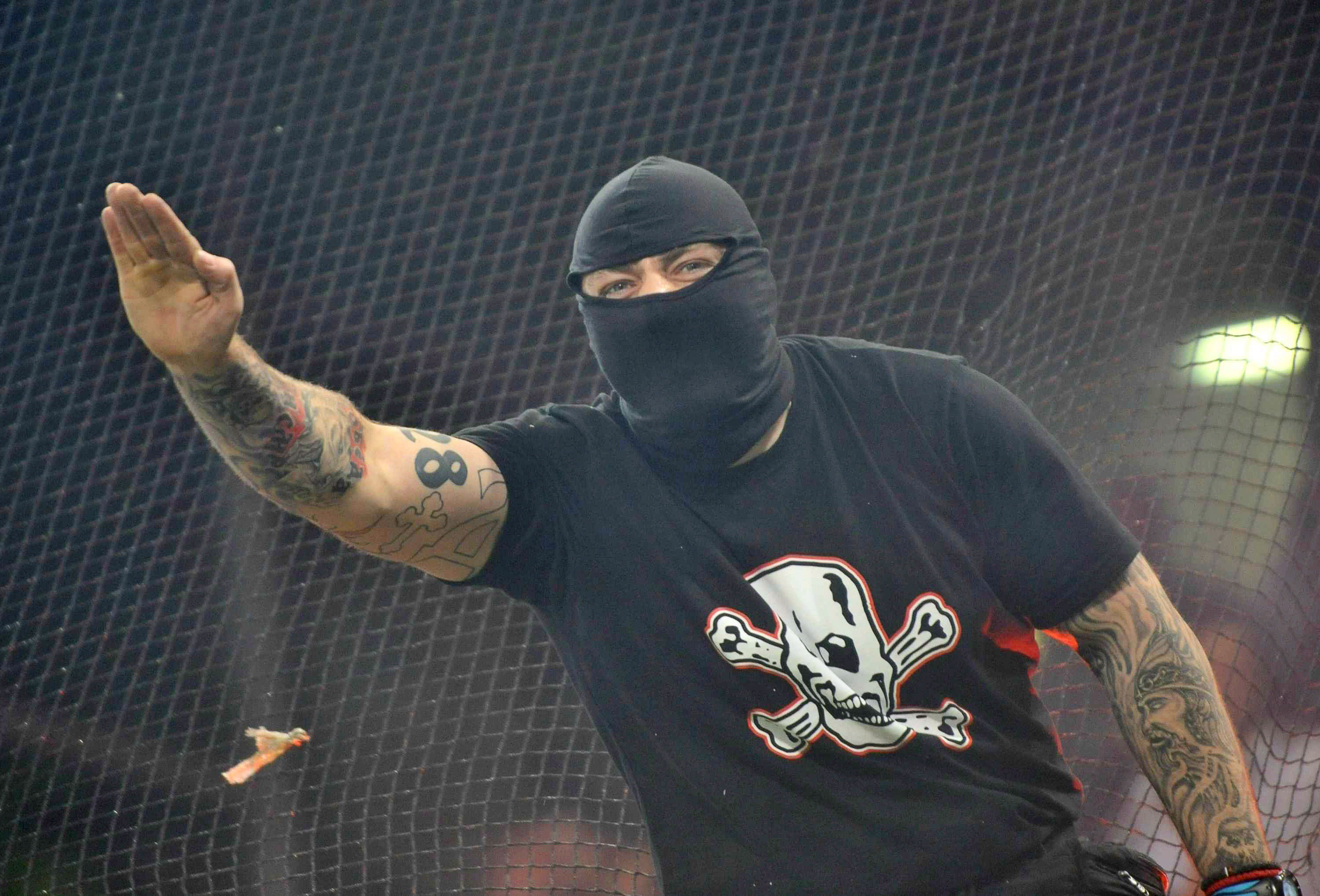
A file picture dated 12 October 2010 shows Serbian fan Ivan Bogdanov before a UEFA EURO 2012 qualification football match between Italy and Serbia. Bogdanov, nicknamed ‘Ivan the Terrible’, was sentenced to three years and three months in jail by a Genoa court in 2011 for his leading role in clashes before and after the match. Photo: © Luca Zennaro / EPA / picturedesk.com
According to Stefanović, Vučković was a soldier until he transferred to the Gendarmerie. He was employed in Serbia’s elite Special Brigade until June 2016. Both the defence ministry and the interior ministry declined to answer questions about Vučković’s role in the military and police. Requests for an interview from the National Council for the Prevention of Violent Events in Sports, an advisory council formed by Stefanović in December 2017, also went unanswered. Đorđević from the Belgrade Centre for Security Policy said Vučković should never have made it through the interior ministry’s screening when he joined the police given his alleged Janjičari links. “Every candidate must pass a security check,” he said. “One of the elements of the security check is getting to know if a person is connected in a direct or indirect way with members of criminal groups. If there are such connections, that person does not belong in the police.” Despite repeated efforts, BIRN was unable to reach Vučković for comment. Various media outlets have linked Vučković romantically with Dijana Hrkalović, a former state secretary at the interior ministry. The ministry did not answer a request for an interview with Hrkalović made prior to her departure from her job, which was announced abruptly in late May with no further details.
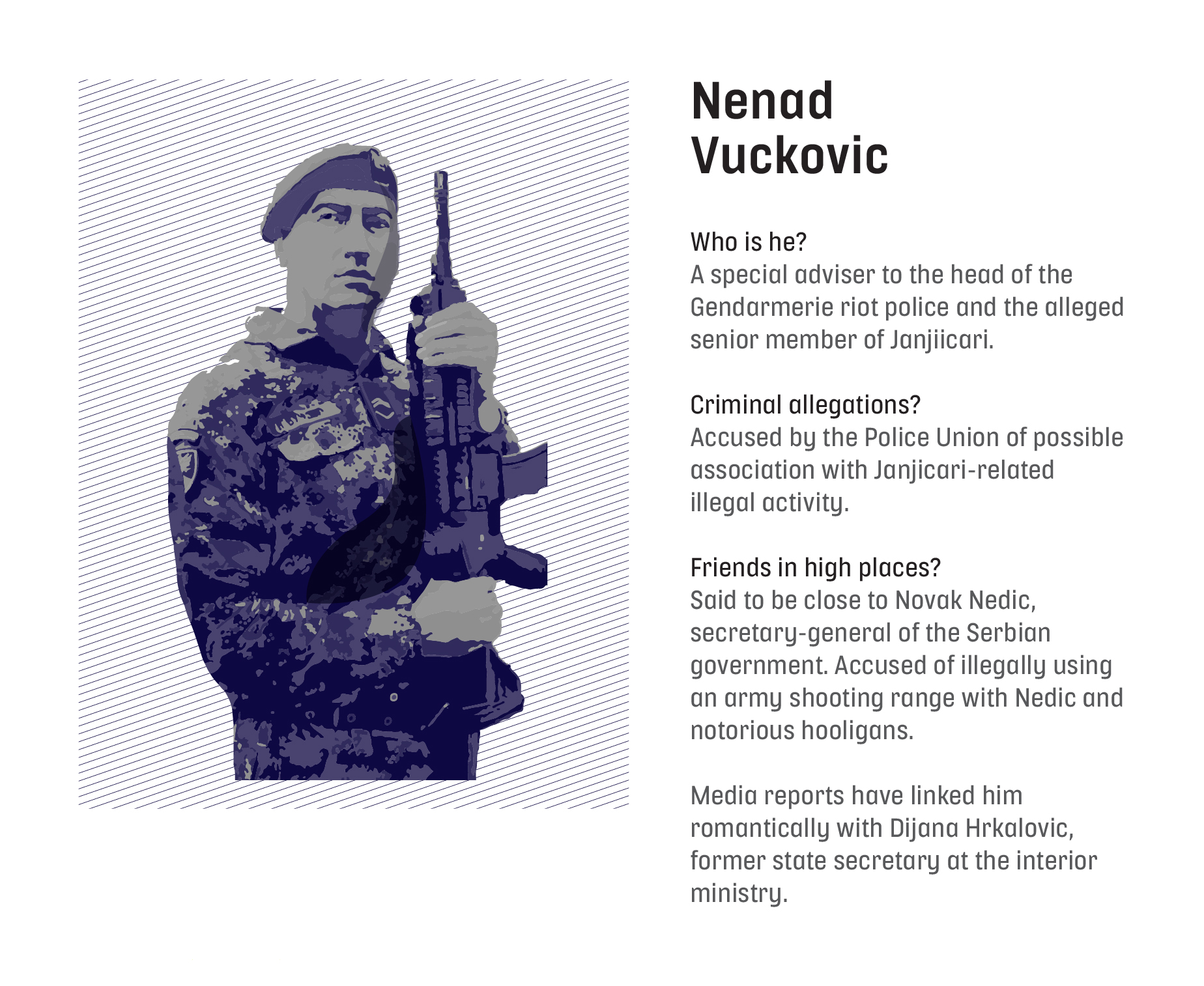
Vučković was once a recognisable presence on the rowdy Partizan south stands, where he has been photographed by local media cheering with Janjičari members including Stanković and Tadić. He has also been an official representative of Partizan fans in the football club’s assembly. In February 2017, the Serbian Army Union claimed that Vučković had repeatedly – and illegally – used an army shooting range, weapons and ammunition for target practice, along with Stanković and another thug from the group, Veljko Belivuk, who has multiple convictions for violent crime. According to the union, a fourth man was with them too: Novak Nedić, secretary-general of the Serbian government. Vučković gave a statement on the matter to the Military Police Crime Investigation group in November 2018. Charges against the overseers of the shooting range were eventually dropped after evidence mysteriously went missing, according to the Crime and Corruption Reporting Network (KRIK), a Belgrade-based investigative journalism outlet. It was not the only time Nedić and Vučković have been accused of wrongdoing.
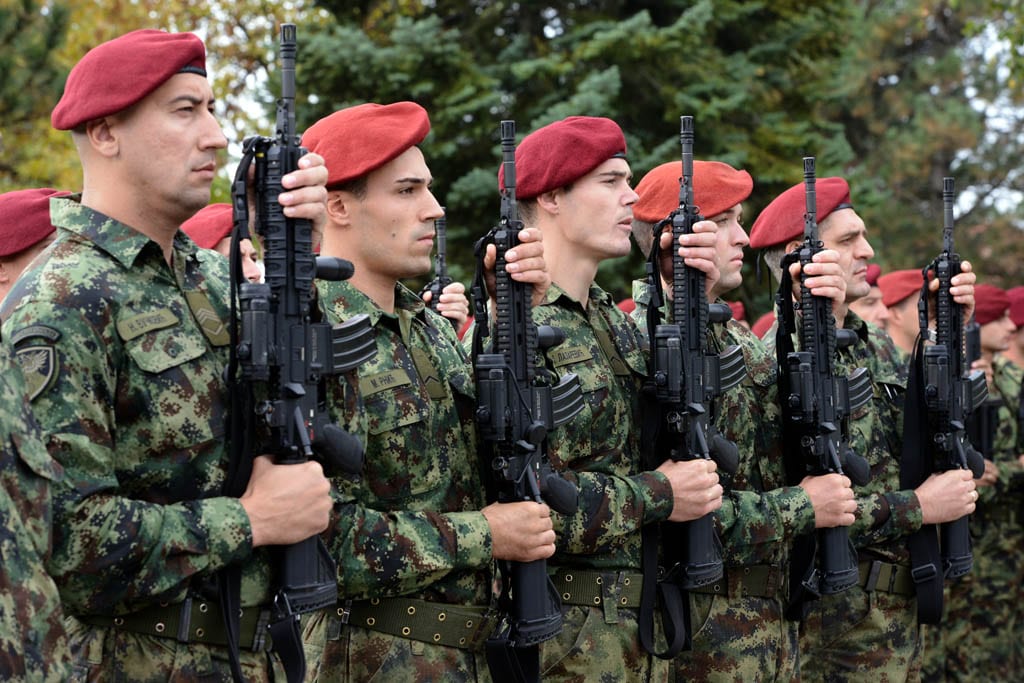
Nenad Vučković, first from left, stands at attention during a military ceremony in honour of the Special Brigade in September 2013. Photo: © Serbia Ministry of Defence, September 2013
Nedić, a 37-year-old former lawyer, had been a member of the Partizan board of directors between August 2013 and April 2014, when he resigned to take up his new job in the government. There is nothing unusual about ruling party members sitting on the boards of big sports clubs in Serbia. But Nedić’s interest in the club did not end with his resignation, club insiders say. In the spring of 2016, Partizan FC issued a press release accusing both Nedić and Vučković of mobilising fans to throw eggs at Partizan top brass in the VIP box “to create an atmosphere of fear and public lynching” ahead of a club election for new management. “It all comes from Novak Nedić, secretary-general of the government,” Milorad Vučelić, Partizan’s acting president, told reporters. He added: “[Instead of eggs], it could be bombs or rocks.” Nedić did not respond to an interview request from BIRN.
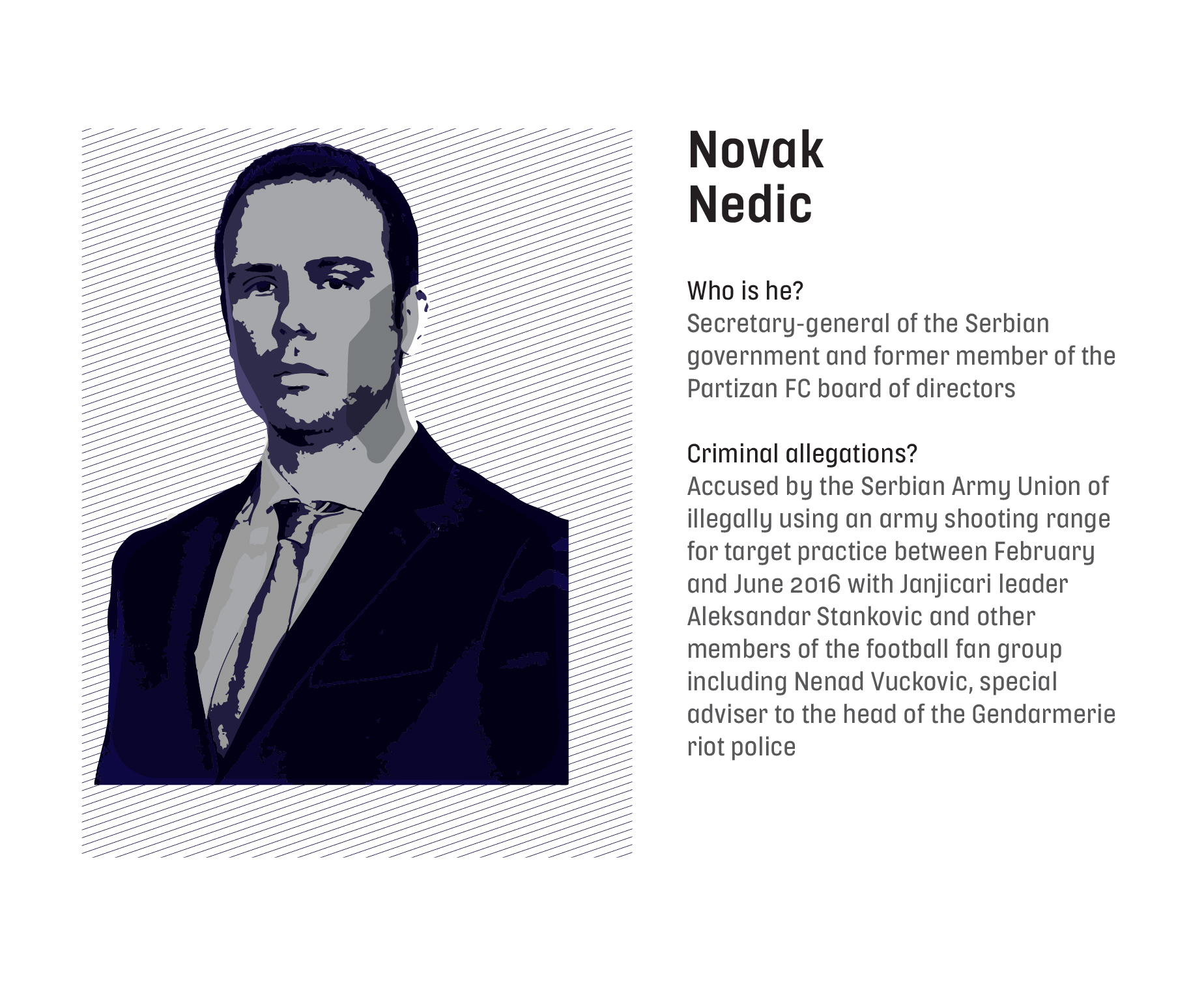
Turning a blind eye?
In June 2018, one of Serbia’s police unions sent a letter to the interior ministry requesting clarification of Vučković’s role at the Gendarmerie after receiving a tip-off about his alleged involvement in underworld activity. In the letter, seen by BIRN, the union referred to an incident in August 2017 when police conducted a routine stop-and-search of an Audi A6 car driven by one Velibor Srećković. Srećković, a semi-professional rugby player who moonlights as a bouncer, was one of the security staff on duty at Tilt on the night clubgoer Slobodan Vukić was allegedly assaulted.
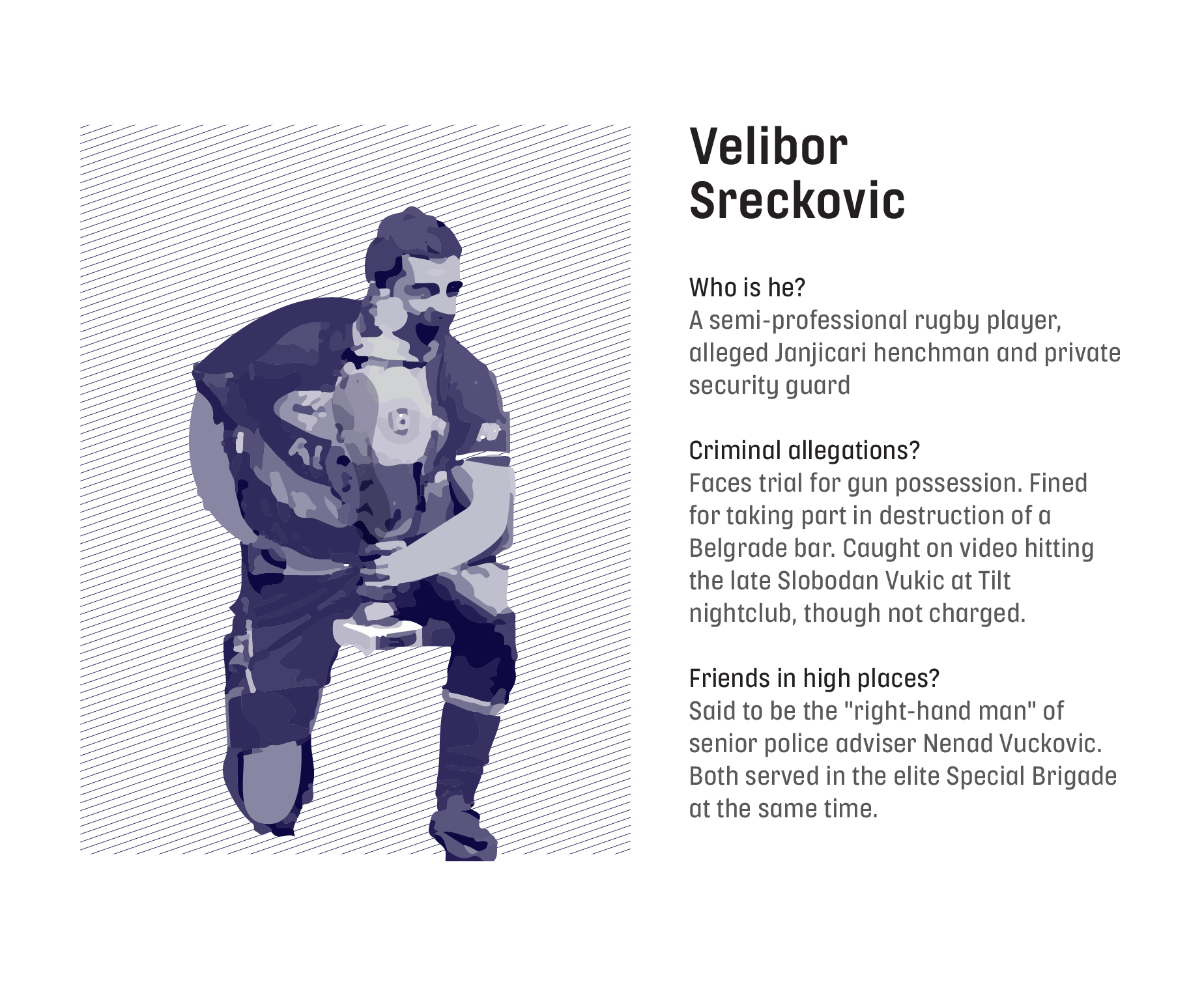
Members of an online football fan forum have referred to Srećković as Vučković’s “right-hand man”. BIRN was unable to reach Srećković for comment. According to the police union, officers found a CZ 99 handgun, 13 bullets, a box for a police badge and a bag of “white powder” hidden in the glove compartment of a car Srećković was in. The Belgrade Higher Prosecutor has indicted him for gun possession. Both the Prosecutor’s Office and the Belgrade Higher Court declined to give BIRN a copy of the indictment but they confirmed his trial is due to start shortly. However, it turned out the Audi was not Srećković’s. The union said in the letter it had reason to believe the car was actually owned by none other than Vučković – and asked Hrkalović, then state secretary at the interior ministry, if she could confirm this.
Dubious friends
The grass was still muddy at the stadium in the southwestern Russian city of Samara when scandal eclipsed the euphoria of Serbia’s win over Costa Rica in the group stage of the World Cup in July 2018. Photos had emerged of Danilo Vučić, the 20-year-old son of Serbian President Aleksandar Vučić, celebrating in the stands with three men identified by media as notorious hooligans with violent rap sheets: Milan Krasić, Boris Karapandžić and Aleksandar Vidojević.
Krasić was sentenced in May 2018 to 14 years in prison for murder – though he appealed and was clearly able to travel to Russia. In May 2019, the appeal court acquitted him and he is now a free man. According to media reports, Vidojević had been prosecuted for brawling in the stands, robbery and gun possession. Karapandžić was sentenced in 2016 to four years in jail for drug dealing, gun possession and violent behaviour – though he was granted parole in March 2017.
Vidojević and Karapandžić were subsequently indicted for smashing up a nightclub right next door to Tilt, in October 2018. A fourth man with them in the stands, Nemanja Srecković (no relation of Velibor Srecković), had been, along with Vidojević, an official representative of fans at Partizan FC’s governing body in 2016. All four are widely known as Janjičari members.
Hugging and cheering in Russia, Vučić Jr and his companions wore T-shirts emblazoned with a map of Kosovo and the words “No surrender” – a battlecry of Serbian nationalist opposition to Kosovo independence. Asked about the company his son kept, President Vučić said it pained him to have to explain to Vučić Jr why journalists were criticising him just because he supported Serbia. “My son has never done anything wrong,” he told reporters.
The interior ministry did not answer the union. Nor did it respond to a request for an interview on the matter with Hrkalović. The union’s tip-off was not the first time Vučković had been connected to Srećković and a suspicious Audi. In 2013, when “Sale the Mute” Stanković was making his power grab, Srećković was suspected of involvement in smashing up the Hollywood café and restaurant, a Belgrade business owned by a rival who led the Alcatraz fan group. According to a police report seen by BIRN, security cameras caught Srećković standing outside on the pavement while men identified as Janjičari thugs went to work inside, breaking furniture and shattering glass. Srećković used an Audi as a getaway car and proceeded to the Pioneer Hall, an indoor sports arena in Belgrade’s Palilula district. According to the police report, he met a man there and handed him the keys of the car. That man was Vučković, the report said.
Police later arrested Srećković on suspicion of taking part in the Hollywood café incident but charges were dropped after he paid a fine of around 330 euros, court records show. No charges were brought against Vučković, who was still in the military at the time. (He did not transfer to the Gendarmerie until two-and-a-half years later.) BIRN can reveal that Srećković and Vučković were both in the military at the same time and in the very same Special Brigade. Srecković left the military two days before the Hollywood café was ransacked. Nikolajev, the owner of Fort Security thought to have employed Srećković at Tilt nightclub, also appears to have served in that brigade. A photo posted on Nikolajev’s Facebook timeline in September 2011 shows him wearing the unit’s distinctive red beret bearing the unit’s crest.
The defence ministry confirmed that Srećković served in the elite force between December 2010 and December 2013. It said he passed security screening before joining. However, the ministry denied that Nikolajev served in the unit. Whether or not any of the men had criminal connections before enlisting in the military, Đorđević from the Belgrade Centre for Security Policy said authorities have a poor track record of weeding out security threats. “In the last six years [since the Progressives came to power], there’s been this trend of turning a blind eye among institutions whenever evidence [of criminal connections] is revealed,” he said. “This leads to the question: if they’re ignoring one case, are they doing the same thing in other cases? Do they actually take care that the people employed by those institutions are clean?” That question is all too real for family and friends of clubgoer Vukić as they await justice.
Tadić, the man accused of dealing the killer blow, was working as a private security guard at public broadcaster Radio Television of Serbia until he was placed in custody for his drug-dealing trial. In trial that started in March, Tadić faces drug-dealing charges, which he denies. During a hearing in this trial in April, his lawyer claimed that Tadić had also worked at the office of Nedić, secretary-general of the government. Asked about this by KRIK, Nedić’s office said it had never hired Tadić. A week later, his lawyer told KRIK there had been a misunderstanding between him and his client. On 12 April, Tadić was released from prison and placed under house arrest with electronic monitoring. However, his fiancee has posted numerous photos and video on social media showing him outside his apartment – and even driving a car. In one picture, Tadic stands in an elevator with his hands in the pockets of his tracksuit top, smiling, while his fiancee pouts at the camera.
First published on 22 July 2019 on Balkaninsight.com.
This text is protected by copyright: © Ivana Jeremić, edited by Timothy Large. If you are interested in republication, please contact the editorial team.
Copyright information on pictures, graphics and videos are noted directly at the illustrations. Cover picture: Serbian riot police officers clash with Red Star soccer fans during a Serbian National soccer league match between Red Star and Partizan in Belgrade in April 2016. Photo: © Darko Vojinović / AP / picturedesk.com
This article was produced as part of the Balkan Fellowship for Journalistic Excellence, supported by the ERSTE Foundation and Open Society Foundations in cooperation with the Balkan Investigative Reporting Network.